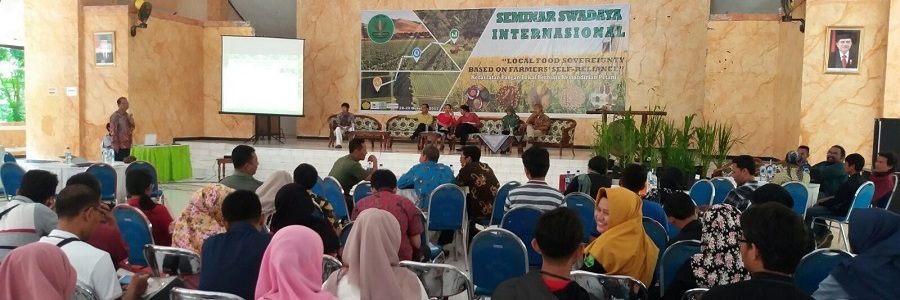
In October 2017, commemorating World Food Day, Navdanya and JAGA Indonesia organized an agroecology mobilization tour in collaboration with local partners in continuation to the mobilization kicked off in 2014 with Dr. Vandana Shiva’s visit to Indonesia and subsequently in 2015, when eleven people from Indonesia attended the “A to Z of Agroecology and Organic Food Systems” course at Navdanya Earth University.
The initiative “Celebrating Seed Freedom & Agroecology” took place in three cities: Jember (October 28th-29th, 2017), Jogjakarta (October 31st, 2017) and Bali (November 4th, 2017). The Navdanya team consisted of Ruchi Shroff, of Navdanya International, Darwan Singh Negi, Navdanya’s Farmers’ Training Co-ordinator and Neha Raj Singh, of Navdanya Trust, India.
The rich dialogues, exchanges and presentations with farmers, policy makers and citizens laid the ground for a transition towards an agroecological food system for food sovereignty, nutrition, climate resilience and economic security.
Also read: Indonesia: An Agroecology Mobilization
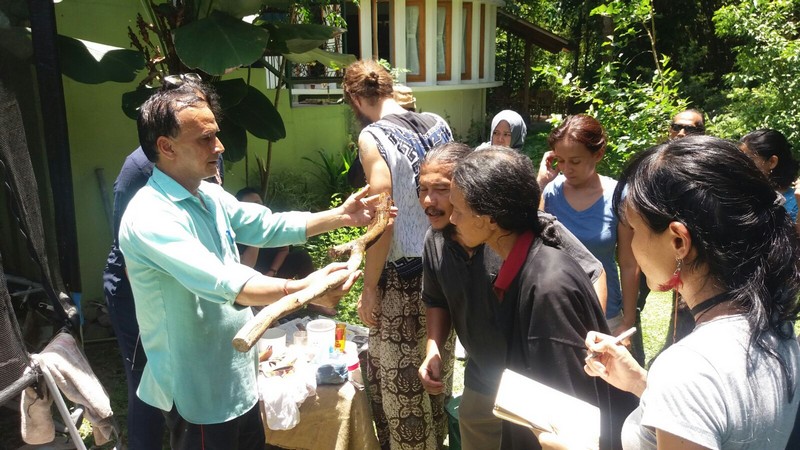 Of major importance to the success of the tour were the 3 agroecology practical training workshops which covered, among other practices, seed saving, natural seed treatment, soil fertility management and natural pest management. Using traditional knowledge Mr. Negi showed how in any natural environment it is possible to find the resources and ingredients to both control pests and weeds, as well as to regenerate soil fertility. As he stated: “We don’t need poisonous chemicals to kill pests and weeds, we have enough knowledge to control them”.
Of major importance to the success of the tour were the 3 agroecology practical training workshops which covered, among other practices, seed saving, natural seed treatment, soil fertility management and natural pest management. Using traditional knowledge Mr. Negi showed how in any natural environment it is possible to find the resources and ingredients to both control pests and weeds, as well as to regenerate soil fertility. As he stated: “We don’t need poisonous chemicals to kill pests and weeds, we have enough knowledge to control them”.
The first event was coordinated by Jaga Indonesia local team and held at Jember University with the participation of students, representatives of the academic community and of local farmers’ organisations. The core theme and title of the panel debate was “Local Food Sovereignty based on Farmers’ Self-Reliance”. Our team highlighted how the dominant industrial agriculture and food system is failing in addressing the multiple crisis we face today. This model, based on large scale monocultures, hybrid or transgenic seeds and a very high use of chemical inputs, is polluting the soil, air and water, eroding biodiversity, killing pollinator insects, increasing greenhouse gases emissions, giving us nutritionally empty food, pushing farmers off their land and disrupting the social fabric of local communities.
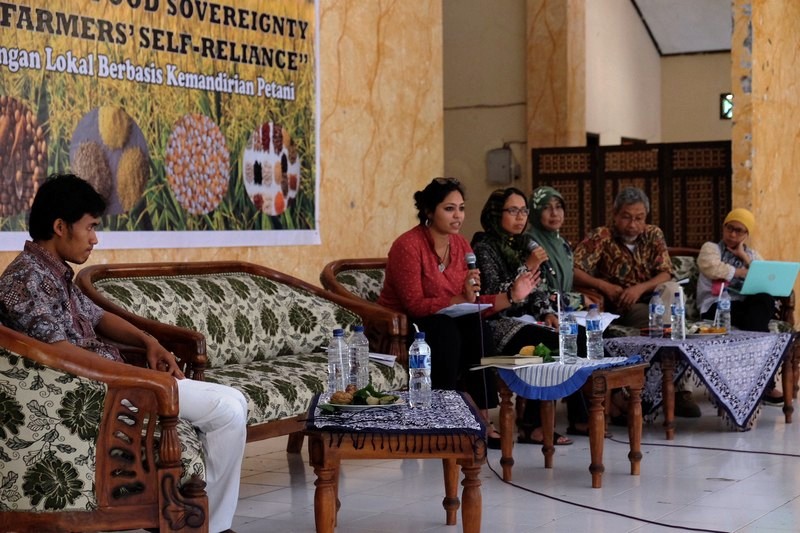 The agricultural food systems and policies that we need should not be based merely on the industrial goal of high production of commodities. As Navdanya’s studies and work show, a Biodiversity-based organic agriculture provides the answer to the issues which should instead be at the centre of the discourse regarding the future of our food – a model that works in harmony with the Earth, increases soil fertility and biodiversity, provides diverse, nutritious and poison-free food, contributes in mitigating and stabilizing climate change, as well as improves farmers’ livelihoods and revives the economy of local communities.
The agricultural food systems and policies that we need should not be based merely on the industrial goal of high production of commodities. As Navdanya’s studies and work show, a Biodiversity-based organic agriculture provides the answer to the issues which should instead be at the centre of the discourse regarding the future of our food – a model that works in harmony with the Earth, increases soil fertility and biodiversity, provides diverse, nutritious and poison-free food, contributes in mitigating and stabilizing climate change, as well as improves farmers’ livelihoods and revives the economy of local communities.
The program schedule at Ekoliterasi Jogja in Jogjakarta saw two days of intense capacity building workshops and inspiring discussions on “Seed: Threats, Challenges and Hopes” with some of the most committed activists, farmers and movements of the region. Representing the local group affiliated to Jaga Indonesia, activist Satriya Wibowo presented a workshop on the loss of biodiversity in Java following the green revolution.
As part of the effort of building networks to share knowledge on the importance of local seeds, the group based their survey and research on asking old farmers from the villages of the rural area of Java about how their farming methods and the varieties of plants they used had been developing and changing from the 1960s’ onwards. It resulted that, for example, in 1960 they used to have 43 carbohydrate sources which have now been reduced to 9, among which only 2 are local varieties and seven are new varieties. In the same year the number of vegetable sources was up to 29, which now have been reduced to 16, mostly hybrid varieties produced by companies that come with pesticides and chemical fertilizers. Also, the 10 varieties of legumes present in 1960 have now been reduced to only 4.
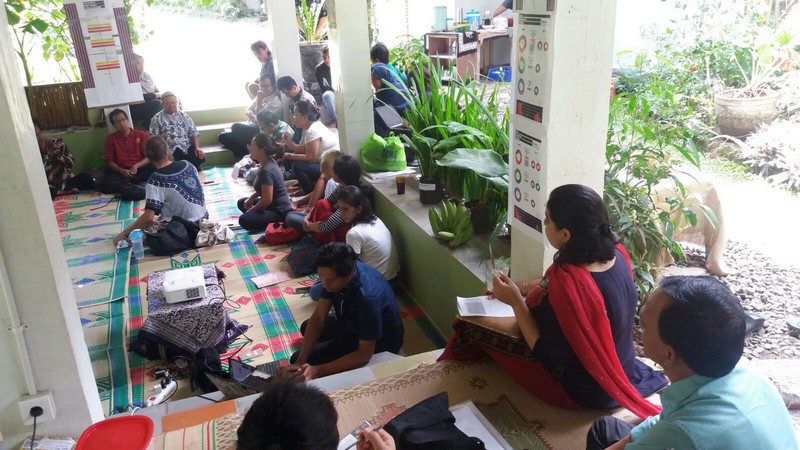 In relation with the work which has been carried out with Mantasa and with other international partners on network building for Seed Freedom, Navdanya’s presentation was focused on showing the vision and achievements of the Global Movement for Seed Freedom and how support in solidarity with each other and timely intervention is vital to stop the corporate hijack of our seed and food, while protecting the Earth, our biodiversity and the well-being of our local communities. Discussions took place and knowledge was shared across different small working groups, from the comparison of the roots of the agrarian crisis in India, Indonesia and other parts of the world, to the importance of connecting citizens movements with farmers who cultivate diversity and of taking care of seeds and traditional knowledge as a community.
In relation with the work which has been carried out with Mantasa and with other international partners on network building for Seed Freedom, Navdanya’s presentation was focused on showing the vision and achievements of the Global Movement for Seed Freedom and how support in solidarity with each other and timely intervention is vital to stop the corporate hijack of our seed and food, while protecting the Earth, our biodiversity and the well-being of our local communities. Discussions took place and knowledge was shared across different small working groups, from the comparison of the roots of the agrarian crisis in India, Indonesia and other parts of the world, to the importance of connecting citizens movements with farmers who cultivate diversity and of taking care of seeds and traditional knowledge as a community.
The third event was held at the Subak Museum in Bali, also to pay a tribute to the millennial tradition of Subak water system distribution in Bali, which well represents the invaluable importance of protecting and defending traditional knowledge. The panel discussion was coordinated by JAGA Indonesia and several other local organisations and saw the participation of farmers, students and local producers. Navdanya was represented both by Neha Raj Singh, of Navdanya Trust, India and Ruchi Shroff, of Navdanya International. The example of Navdanya’s program with farmers in India, and how keeping seeds, biodiversity and traditional knowledge in people’s hands as commons, has proven to be the basis to generate livelihoods both for farmers and local communities, as well as empower the ability of facing extreme climate change related events. In India the network of more than 122 community seed banks established by Navdanya was able to save more than 6000 climate resilient, salt tolerant, drought tolerant local farmers’ varieties of seeds, which were also used to meet the needs of areas hit by extreme floods and/or droughts.
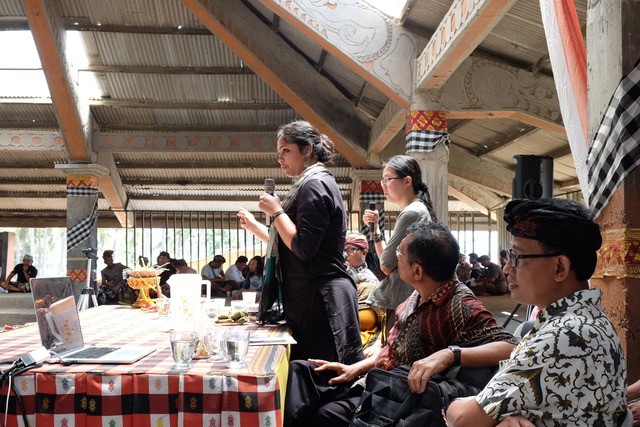 Along the same lines, Navdanya’s team brought examples on how the Green Revolution and its development into large scale industrialised agriculture has generated a deep crisis in farmers’ livelihoods in India, as well as in Indonesia and in other parts of the world. This agriculture model is mostly hitting small farmers, who still are those who provide 70% of the food we eat globally and who hold the knowledge of seed breeding which was developed over millenia and has brought us the diversity of edible crops we know today. Those who promote this “agricultural transformation” of the ‘Green Revolution’ are often supported by government subsidies for farmers and come with promises of good outcomes. When farmers stop breeding their seeds, cultivating diversity and taking care of the soil by replacing these practices with a sponsored package of commercial hybrid seeds, fertilisers and pesticides, they start depending on the market as they no longer produce for their own needs and their communities, but instead for the demands of the global market. Besides loosing seed and food sovereignty – and therefore their freedom, the consequences can also be seen in the impact that this system has on people’s health, on the environment, and on the future of our children. The work of Navdanya in the last 30 years has been about uncovering the underlying lies of the green revolution, backed by the richest corporations of the world, and claiming the power back into the hands of the farmers, as well as promoting the alternatives that are actually in the hands of rural communities. Farmers all over the world are realising the reality of what is happening, and they are organizing and fighting back. They are claiming back their seeds, their lands, their traditional knowledge and implementing ecological agriculture based on preserving biodiversity and soil fertility.
Along the same lines, Navdanya’s team brought examples on how the Green Revolution and its development into large scale industrialised agriculture has generated a deep crisis in farmers’ livelihoods in India, as well as in Indonesia and in other parts of the world. This agriculture model is mostly hitting small farmers, who still are those who provide 70% of the food we eat globally and who hold the knowledge of seed breeding which was developed over millenia and has brought us the diversity of edible crops we know today. Those who promote this “agricultural transformation” of the ‘Green Revolution’ are often supported by government subsidies for farmers and come with promises of good outcomes. When farmers stop breeding their seeds, cultivating diversity and taking care of the soil by replacing these practices with a sponsored package of commercial hybrid seeds, fertilisers and pesticides, they start depending on the market as they no longer produce for their own needs and their communities, but instead for the demands of the global market. Besides loosing seed and food sovereignty – and therefore their freedom, the consequences can also be seen in the impact that this system has on people’s health, on the environment, and on the future of our children. The work of Navdanya in the last 30 years has been about uncovering the underlying lies of the green revolution, backed by the richest corporations of the world, and claiming the power back into the hands of the farmers, as well as promoting the alternatives that are actually in the hands of rural communities. Farmers all over the world are realising the reality of what is happening, and they are organizing and fighting back. They are claiming back their seeds, their lands, their traditional knowledge and implementing ecological agriculture based on preserving biodiversity and soil fertility.
The event also featured a group of Balinese speakers, academics, policy makers, activists and farmers’ groups representatives. Many local producers, farmers and local organisations displayed their products and work at stands and demo stations in the dedicated market area.
It can be said that each event turned out to be highly motivating, rewarding and inspirational for all participants, including the organizing teams. The tour represented a unique opportunity to bring local and institutional organizations and initiatives together, to stimulate public awareness, including local authorities, of the importance of agroecology to achieve sustainable food systems in the country, to fortify and broaden the practices and existing network of agroecology, including the local seed movement, to help define and support specific programs to build agroecology as the foundation of future food systems.
Related Campaigns and Publications
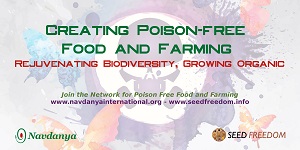
Poison Free Food and Farming
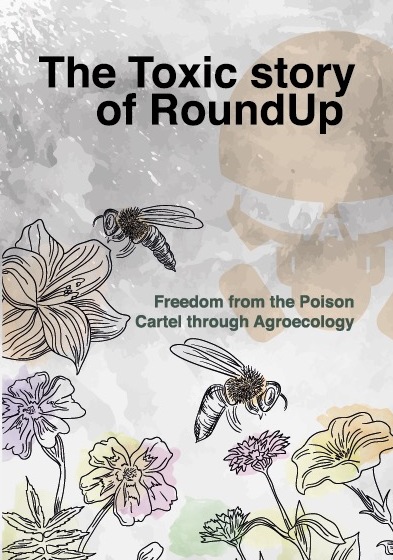
The Toxic Story of RoundUp: Freedom from the Poison Cartel through Agroecology
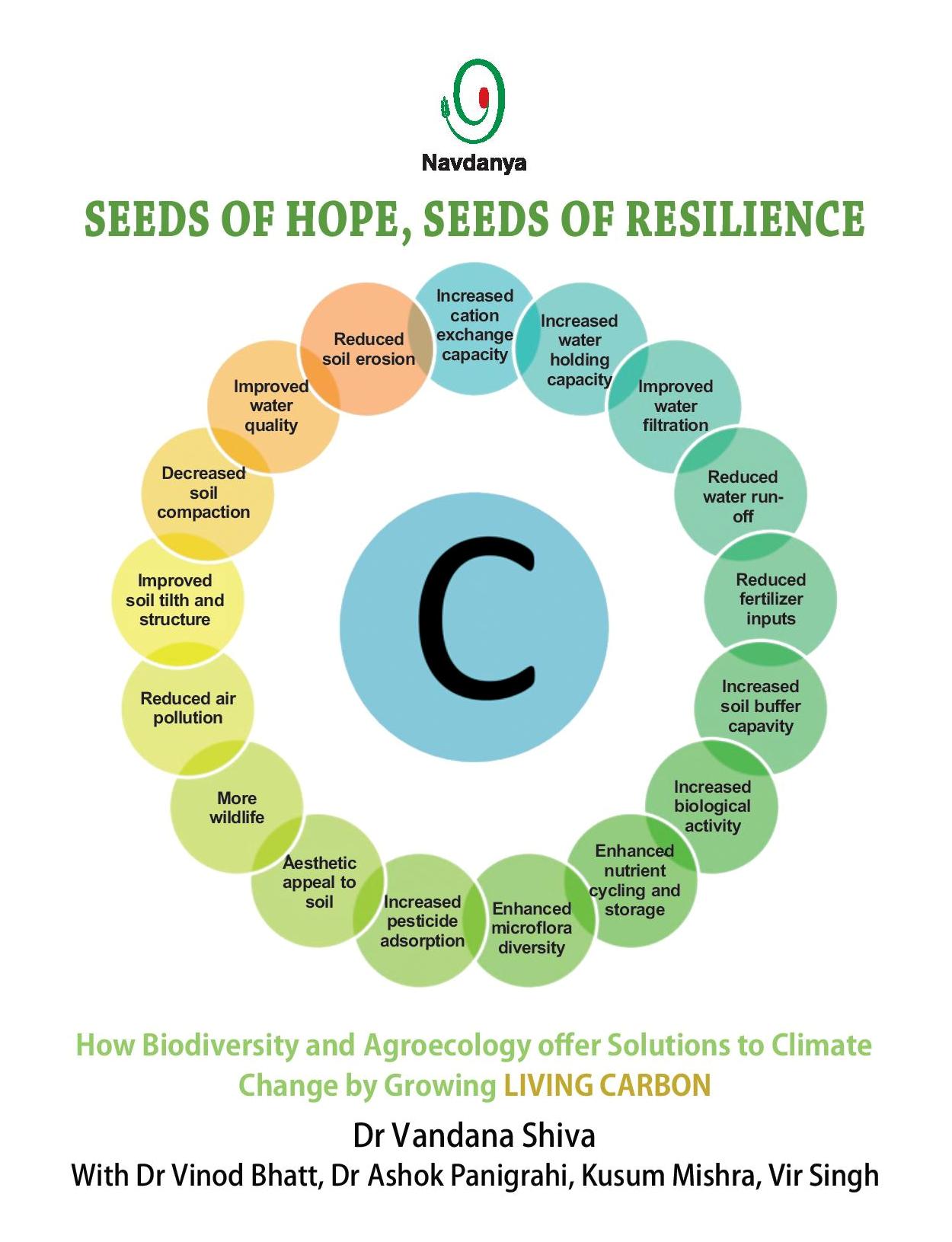
Seeds of Hope, Seeds of Resilience: How Biodiversity and Agroecology offer Solutions to Climate Change by Growing Living Carbon
Also read
Our biodiversity, our life, our future
By Dr Vandana Shiva – The Asian Age, 6 October 2017
How agricultural chemicals are poisoning our world. And all the (false) myths about them
By Ruchi Shroff – Lifegate, 18 September 2017
Food and farming: Two futures
By Dr. Vandana Shiva – The Asian Age, 12 July 2017
The Farmers’ Crisis
By Dr Vandana Shiva, 5 July 2017
Seeding the Future, Seeding Freedom, One Seed at a Time
By Dr Vandana Shiva, 8 February 2017
